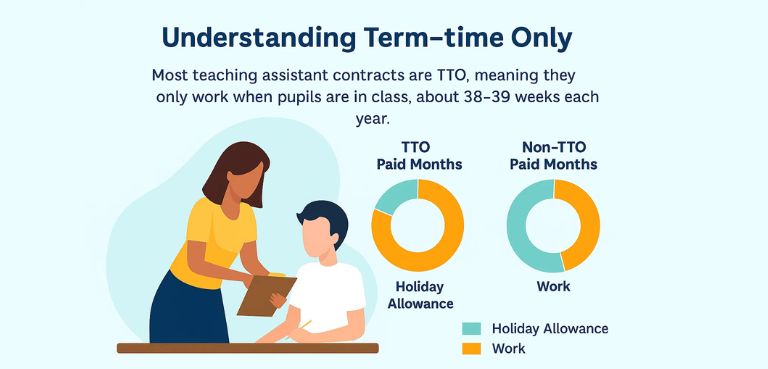If you’re a Teaching Assistant (TA) or thinking of becoming one, you’ve probably wondered, “Do teaching assistants get paid for holidays?” when the school breaks arrive. What a brilliant, but slightly stressful, question! It’s a common worry that pops up every single school break.
Do I genuinely receive compensation for this leave of absence, or am I just operating on fumes?
Let’s be honest, being a TA is an incredibly rewarding job. You get to make a real difference in the lives of children every single day. Unlike a regular office job, the school year has term-time and long holidays, which can make pay and schedules confusing.
That’s why it’s essential to understand your contract, how your pay works, and what “term-time only” really means for your income. No one wants to find their bank account empty in August, right?
What Does “Term-Time Only” Mean for Teaching Assistants?

Let’s start with the phrase you’ll see everywhere: “Term-Time Only”, or TTO.
For most TAs, especially in the UK, your contract will be TTO. Which means you only work during school terms, when pupils are in class. This is typically around 38 or 39 weeks out of the 52 weeks in a year.
It sounds simple enough, but here’s where the nuance comes in. When you hear “term-time only”, you might think, “So I’m only paid for 38 weeks.” That’s true—you only work during those weeks. However, for most TAs, your pay is spread out evenly through the year, which can seem a bit confusing at first.
Instead of being paid only during term time, your total yearly pay, including holiday pay, is divided into equal monthly payments. This process, known as annualisation, is designed to give you a consistent, predictable income. The good news is that you get a monthly wage, even in July and August! The downside is that your monthly pay is pro-rata — based only on the 38 to 39 weeks you work, including your holiday allowance. It’s not a full-time, year-round salary. It’s a proportional salary paid across a full year.
Do Teaching Assistants Get Paid for Holidays in the UK?
The answer to this is a classic “it depends on your contract,” but we can absolutely shed some light on the common scenarios.
1. The Full-Year TA (The Rarest)
If you’re a permanent TA on a 52-week contract, then yes—you’re paid for holidays just like in most other jobs. Thus, you work all year round (except for your holidays) and earn a full-time annual salary. This is the type of contract most TAs have, and as mentioned, the way pay is arranged works differently.
2. The Term-Time Only (TTO) TA (The Most Common)
This is the contract most TAs hold, and as we discussed, the payment mechanism is different.
- You do receive a payslip during the holidays. This is thanks to the pay being annualised (spread over 12 months).
- You are not being paid ‘extra’ for the holiday period. That monthly pay is simply a portion of the total annual salary you earned during the working time. Your holiday pay entitlement is legally bundled into that annualised amount.
So, in a conversational way, are you paid for holidays? Yes, you receive money in those months! But it’s money you’ve already earned — including your holiday pay — just spread out to keep your income steady. It’s a key distinction to understand!
To see a detailed breakdown of TA pay, including hourly rates, pro-rata calculations, and budgeting tips, check out our full guide, Teaching Assistant Salary in the UK in Unified Course.
How Term-Time Pay Is Calculated and Spread Over the Year
It can be difficult to interpret the math on your payslip, but once you see it, everything makes sense. This is the mechanism that ensures you get a monthly pay cheque. Your annual salary isn’t for 52 weeks of work — it’s based on the weeks you actually work (around 39, including INSET days) plus your holiday pay.
Here’s a simplified breakdown of the general logic:
- Calculate Weeks Worked: This is your term time, for example, 39 weeks (including those INSET days). INSET stands for In-Service Training days. These are days when students stay home, but teachers and TAs come in for training, planning, or meetings.
- Calculate Statutory Holiday Entitlement: Each worker in the UK is legally allowed 5.6 weeks of pro rata paid yearly leave. For a TTO contract, this holiday entitlement is worked out as a proportion of the time you do work. Often, this results in an extra few weeks of paid time.
- The Total Paid Weeks: The 39 working weeks are combined with your holiday allowance (about 5 to 6 weeks), giving a total of roughly 44 to 45 paid weeks.
- The Annual Salary: Your hourly rate is multiplied by your weekly hours and then by the total number of paid weeks. This figure is your actual gross annual salary.
- Annualisation: Crucially, this total annual salary is then divided by 12 and paid to you in equal monthly instalments.
Why does this matter? It means that the money you receive in August is not a magical gift from the school; it is the final instalment of your total annual earnings. You earn your pay across the year, and the school spreads it out monthly, so you still get paid during school breaks.
Full-Time vs Part-Time TA Pay: What’s the Difference?
The terminology here can be a little confusing, so let’s clarify the two major ways a TA contract is structured:
1. Full-Time, Year-Round Contract (The 52-Week Model)
- What it is: This is the traditional employment model. You are employed for 52 weeks of the year.
- The Pay: You receive a salary that reflects working 52 weeks (minus your contractual annual leave). Your annual income will be much higher than an equivalent TTO TA, as you are contracted for more weeks.
- Holiday Pay: You accrue and take your holiday leave throughout the year, just like any other full-time job.
2. Part-Time / Term-Time Only (TTO) Contract (The 38-39 Week Model)
- What it is: The overwhelming majority of TA roles fall into this category. You are only contracted to work during the school term.
- The Pay: Your actual annual income is calculated only on the weeks you work, plus your pro-rata holiday entitlement. The gap between your real annual pay and the advertised full-time equivalent (FTE) salary can be large. For example, if a job lists £21,000 FTE pro rata, your actual pay will be lower since you only work part of the year.
- Holiday Pay: Your holiday pay is included in your yearly salary, so you’re paid each month, but it’s not extra money; it’s just what you’ve already earned.
This variation is perhaps the most important point in this entire discussion. A term-time only (TTO) TA’s salary is a full-year salary reduced to match the weeks they actually work.
What Happens During School Holidays for Teaching Assistants?
So, the school bell rings for the last time before the summer, and a wave of calm washes over the building. What does that break really look like for TAs?
- For the Annualised (TTO) TA: You usually don’t work during holidays unless asked for extra tasks, which are typically paid separately. Your monthly pay cheque continues to arrive, providing that essential financial security. You are taking your mandatory, paid annual leave during the school closure periods.
- For the Hourly/Supply TA: If you are a TA employed on a purely hourly or short-term supply contract, the situation can be very different. Your pay is often based solely on the hours you clock. If your contract doesn’t include paid holidays and the school closes for six weeks in summer, your pay can drop to zero. So always check your contract and plan your budget.
The key point is that for most permanent TAs, holidays are paid because your total yearly pay is spread across the year. However, you must take your holiday when the school decides, usually during closure periods.
Are Teaching Assistants Entitled to Holiday Pay? The Legal Bit
This is where the law steps in and provides a necessary safety net. The quick and firm answer is:
Indeed, all employees in the UK, including teaching assistants, are legally entitled to a minimum of 5.6 weeks of paid leave annually.
The Pro-Rata Principle
Pro rata essentially means “proportional”.
- A full-time worker works 52 weeks and gets 5.6 weeks’ holiday on top.
- A TTO worker only works, say, 39 weeks, so their 5.6 weeks’ entitlement is calculated based on those working weeks.
Historically, holiday pay for term-time workers can be a bit tricky. But the rule is simple: you must get at least the legal least. For TTO TAs, it’s included in your yearly salary and paid monthly, not as a separate bonus.
How to Check If Your Contract Includes Paid Holidays
Grab your contract if all of this seems confusing! All the answers are contained in this booklet, which serves as your map. These are the essential items to search for:
- Contract Type: Is it a “Permanent Full-Year” or “Permanent Term-Time Only” (TTO) contract? This is the fundamental difference.
- Number of Weeks Paid: Look for a clause that specifies the total number of weeks you are paid for. It will often read something like “39 weeks working plus 5.6 weeks’ statutory leave, paid across 52 weeks.” The number of weeks paid will be higher than the weeks you actually work.
- Annualisation Clause: Check if your contract or pay details say the salary is “annualised” or “paid in 12 equal monthly instalments”. This shows your pay is spread across the year.
- Holiday Entitlement Clauses: There should be a specific section on annual leave. It will likely mention the 5.6 weeks’ statutory minimum and confirm that you must take this leave during school closure periods.
- Ask HR: If you are still confused, don’t be shy! Your school’s Human Resources (HR) department or the Local Authority’s payroll team is there to clarify this. A simple email saying, “Can you confirm the total number of paid weeks my salary is based on?” can clear up any confusion instantly.
Tips to Manage Income During School Breaks
Knowledge is power, especially when it comes to money. Even though annualised pay helps smooth your income, a TTO salary is still much lower than a full-time, year-round equivalent. As a result, it can feel especially tight during the long summer break.
Here are a few actionable tips for managing your money throughout the year:
- Know Your Annualised Pay: Stop looking at your monthly pay slip as a ‘full’ month’s wage. See it as an equal slice of a smaller, term-time-based annual salary. This shift in perspective helps you budget realistically.
- The Holiday Pay Check-Up: If your contract is not permanent (e.g., if you are supply or on a short-term contract), you need to be particularly vigilant. Make sure your hourly rate includes an uplift (often 12.07%) for “rolled-up holiday pay” or that accrued leave is paid at the end of your contract. Never assume you are being paid for the holiday unless it’s in writing.
- Budgeting for the Drop: Even with annualised pay, TTO TAs sometimes find their pay scale lower than they initially expected. Treat your annualised monthly pay as a fixed income, and budget carefully each term to have a buffer for the long, unpaid holiday months.
- Part-Time Holiday Work: If you need extra income, the school holidays offer a perfect, uninterrupted window to earn money. Consider short-term roles in summer camps, retail, or hospitality. Because your contract allows you to be off work, you are free to seek other employment during the break.
Final Thoughts: Understanding TA Pay and Holidays
Being a Teaching Assistant is a vital, challenging, and rewarding career path. But it comes with a unique pay structure that is very different from the standard 9-to-5 world. The question of whether TAs get paid for holidays comes down to one key idea: the Term-Time Only (TTO) and annualised pay model. You work part of the year, but your pay is spread over 12 months, so your income stays steady.
Your mission now is to read your contract carefully! Furthermore, know your pro-rata pay and how many weeks it covers to budget well and enjoy school holidays without money worries.
If you’re ready to take your skills further and increase your value in the classroom, consider upgrading your expertise with our Level 3 Teaching Assistant course! It’s the smart step toward career growth and higher earning potential.
FAQs: Holiday Pay for Teaching Assistants
Do TAs get paid during the summer?
- Usually not, unless their contract spreads pay across the full year or they work all year round.
Do teaching assistants get paid 52 weeks?
- Most are paid for term-time only, but some schools spread the total pay over 12 months.
What do teaching assistants do in the summer?
- They usually take time off or use the break for training, planning, or part-time work.
How do teaching assistants get paid?
- They’re paid monthly, either for term-time only or averaged across the year.
Do TAs get paid for annual leave?
- Yes, but it’s included in their term-time salary instead of being paid separately.
Why do TAs get paid so little?
- Their pay reflects term-time contracts, limited hours, and school budget constraints.
Why do teaching assistants not get holiday pay?
- They do, but it’s built into their term-time pay rather than paid during holidays.
What is the 70/30 rule in teaching?
- It means roughly 70% of the time is spent teaching and 30% on planning and marking.
How much are TAs paid per hour?
- On average, between £11 and £14 an hour in the UK, depending on experience.
Is being a TA a stressful job?
- It can be busy and demanding, but it’s also rewarding and impactful.
Do school support staff get paid for holidays?
- Only if their contract includes holiday pay, which many term-time roles do.
Can a TA legally teach a class?
- They can supervise lessons, but only qualified teachers can plan and lead them.
Do TAs get paid for lunch?
- No, lunch breaks are usually unpaid unless stated in their contract.
How to earn more money as a teaching assistant?
- Take on extra duties, gain higher-level qualifications, or move into full-time or SEN roles.
Will teaching assistants get a pay rise in 2025?
- It depends on national or local pay reviews set by councils or the government.
How much does a TA get paid in the UK per hour?
- Most earn around £11 to £14 an hour, depending on the area and experience.
Why are schools getting rid of TAs?
- Mainly due to funding cuts or school restructuring, not because of job performance.
How many hours does a TA work?
- Typically 25 to 32 hours per week during term time.




